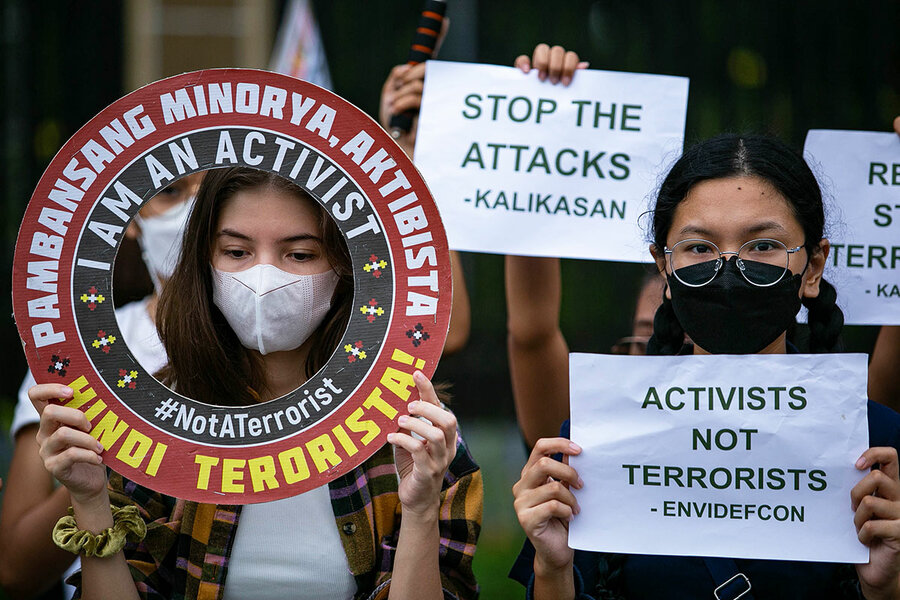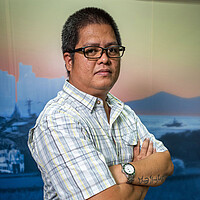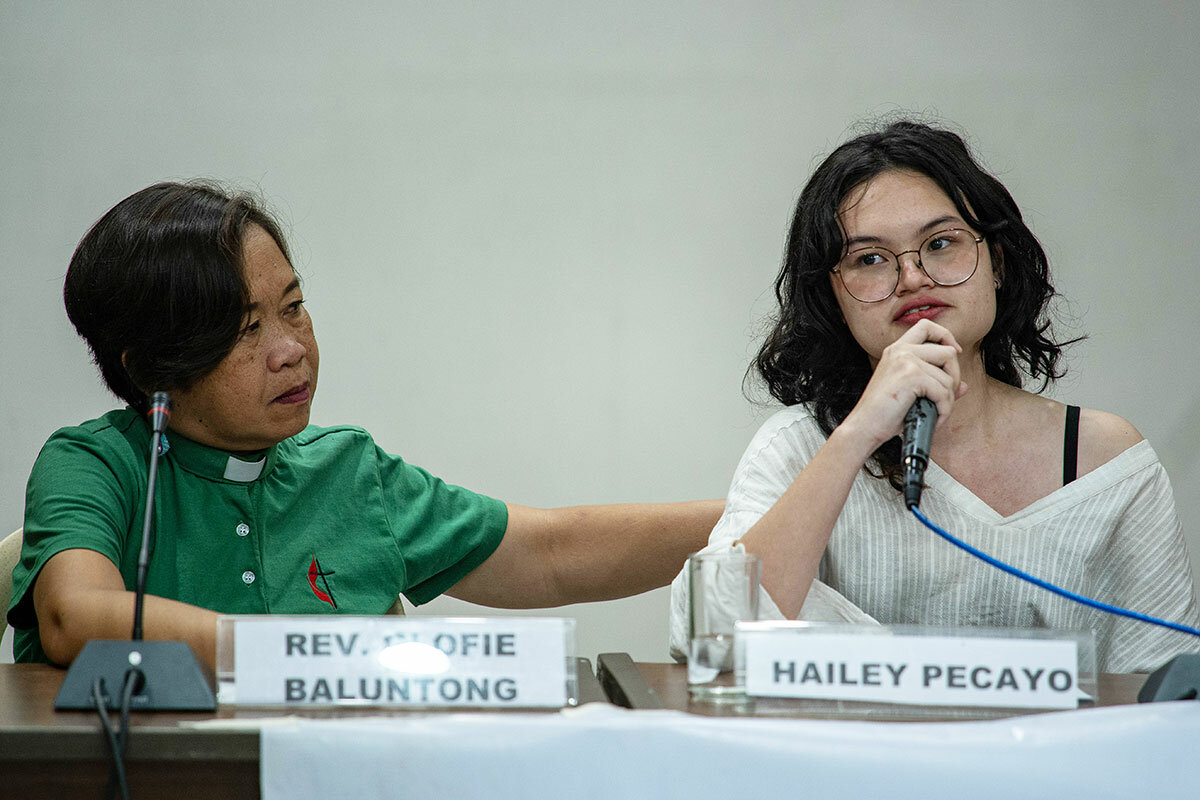Activist or terrorist? How Filipino authorities blur the line.
Loading...
| Manila, Philippines
The Rev. Glofie Baluntong wishes she could be preaching the gospel and serving the poor in the Philippines’ Mindoro province right now. Instead, she’s sitting tight, away from her parish, praying that the government will absolve her of the “terrorist” label that’s loomed over her for the past year.
“I miss my community, but we have to consider not just my safety but also the safety of the people I serve,” says Ms. Baluntong, a deaconess for 24 years before she was ordained.
For decades, her ministry has focused on serving the region’s Mangyan Indigenous people by conducting humanitarian works and promoting human rights through education. Everything changed in 2019, when the military accused the pastor of having ties to the Communist Party of the Philippines, which the government considers a terrorist organization. In August 2022, she was subpoenaed for alleged violations of the country’s controversial anti-terrorism law, and she hasn’t seen home since.
Why We Wrote This
A story focused onWho’s considered a terrorist in the Philippines? The designation of activists and Indigenous leaders as “terrorist individuals” has sparked calls to revisit the country’s approach to domestic security.
Indeed, the “red-tagging” of Indigenous leaders and activists has been an ongoing problem. It was made worse, rights groups say, after the 2020 Anti-Terrorism Act endowed the newly formed Anti-Terrorism Council (ATC) with vast power to designate and investigate domestic terrorists. The council has since designated 35 people as terrorists for alleged connection to the communist rebels, and that number is rising. Just last month, the council announced the names of four Indigenous leaders in the northern Philippine region of Cordillera now designated as “terrorist individuals.” Government officials maintain that the council is necessary for fighting insurgencies, but rights groups say it’s become a tool for silencing dissent.
“The government said the law [will] target terrorists such as the ISIL-linked Abu Sayyaf fighters in the southern Philippines,” says Liza Maza, spokesperson of the Council for People’s Development and Governance, a countrywide network of nongovernmental organizations. “But now it is being used against human rights defenders, activists, and development workers advocating for fundamental political and economic reforms.”
Closed-door process
For a person or organization to be labeled a terrorist in the Philippines, the council need only find probable cause that they “commit, or attempt to commit, or conspire in the commission of” any terrorist act.
Attorney Ephraim Cortez of the National Union of People’s Lawyers describes the Anti-Terrorism Act as “very dangerous.”
“Unlike in other cases where the accused is assumed innocent unless proven guilty beyond a reasonable doubt, the ATC can identify a person as terrorist even without concrete basis,” the lawyer says, adding that the suspect “has no participation in the proceeding.”
Last year, the Supreme Court broadly upheld the law despite challenges from dozens of groups. Chief Justice Alexander Gesmundo spoke to peoples’ fears over its implementation in May.
“We must balance the need for security with the protection of individual rights and freedoms,” he said. “While we accept the necessity for urgent and enhanced security measures, these must be done within the confines of the law, with proper checks and balances, to guarantee that there is no undue or excessive intrusion to our rights and freedoms.”
However, critics say the vaguely worded law has already allowed authorities to weaponize the “terrorist” label with little to no recourse for targets.
Disrupted work
The rights alliance Karapatan has sounded the alarm over the increasing use of the anti-terrorism law against political activists and human rights defenders in recent months.
“There is a pattern,” says Cristina Palabay, secretary-general of Karapatan. “Before activists are charged with alleged violations of the anti-terrorism law, they are red-tagged, accused of being members of the Communist Party of the Philippines or supporters of the New People’s Army.”
In the Southern Tagalog region alone, 15 activists, including Ms. Baluntong and pastor Edwin Egar of the United Church of Christ of the Philippines, were “maliciously charged” under the provisions of the law, she adds.
Ms. Baluntong faces a 2021 murder charge, which she and other church leaders deny, and an Anti-Terrorism Act violation. Both, supporters say, are part of a red-tagging campaign against the Methodist pastor.
“These baseless accusations forced me to vacate my assignment. So these are not just attacks against me but also attacks against the church and the Mangyan community,” says Ms. Baluntong.
She’s not alone. The council recently “found probable cause for violations” of the anti-terrorism law against the Cordillera Peoples Alliance (CPA) chairperson, Windel Bolinget, as well as alliance leaders Jennifer Awingan, Sarah Abellon-Alikes, and Stephen Tauli.
In a press briefing, Undersecretary Ernesto C. Torres Jr., executive director of the National Task Force to End Local Communist Armed Conflict, said the designation of the alliance leaders “is a crucial step in safeguarding national security and ensuring the safety of our communities.”
Immediately after the designation, the country’s Anti-Money Laundering Council issued an order to freeze the four activists’ assets. Sarah Dekdeken, secretary-general of the CPA, says the organization’s bank account was also frozen because Mr. Windel is a signatory.
“These are attacks with clear intent to silence individuals and people’s organizations like the CPA that are critical of anti-poor and anti-Indigenous people policies of the government,” says Ms. Dekdeken, adding that the alliance has submitted a petition to unfreeze its account as well as the properties of the activists and their families.
No recourse
The Indigenous leaders say not only that the designation is unjust, but also that the “lack of due process” has subjected them and their families “to unwarranted prejudice and adverse consequences.”
Mr. Cortez, the attorney, explains that the only remedy the anti-terrorism law provides a designated person is a call to submit a request for delisting – which all four CPA leaders did on July 17. But he notes that “there is no provision that allows an individual to question the factual and legal basis of the designation made by the council.”
For him, the priority is getting the law back in front of the Supreme Court. This time, he says, the discussion will revolve around how the government implements the law, rather than the provisions of the law itself.
“We must really bring the discussion on its constitutionality back into the halls of the courts,” says Mr. Cortez.







